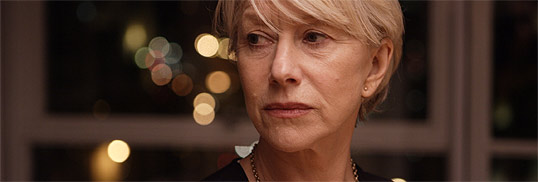October 16, 2006

Up until now, I've never been entirely convinced by Prime Suspect but, credit where its due, the latest - and last - installment is absolutely superb.
I'm sure Helen Mirren is outstanding as the Queen - I must confess, I have no urgent desire to go and see what must turn out to be de facto monarchist propaganda (whose message would have to be: deep down, the Queen is a human being, just like us) - but I doubt that her performance could better this. One line on her face is more expressive than most thesps' whole careers. A look, a faint change of expression is enough to carry the unbearable weight of Prime Suspect 7's great theme, mortality. Mortality threatens Mirren's Jane Tennison in many forms: her age (at one point, she sees herself in the mirror and seems unable recognise herself, an increasingly common experience as one gets older), doubts about wrong choices (the reproaches of empty hallways, address books full of names that she cannot call when in need of succour), the death of her father (the scenes with Frank Finlay, also excellent, imply a lifetime of evasions, frustrations and inadequately handled affections). There were at least three moments that provoked tears, and not cheaply.
I was never convinced by Cracker either - I always thought it too pleased with itself, Fitz's 'shocking psychological insights' amounting to shopworn Catholic nihilism - and when it returned for a special two weeks ago, all my misgivings were confirmed. The 'political' points were rather too easy, depending upon a plot that lacked any credibility; and Fitz's alcoholism and gambling, as ever, were rather too picturesque. The alcoholism in the latest Prime Suspect, by contrast, is squalid, an embarrassment , not some machismo vice of which one is (not so) secretly proud.
Alcohol, in fact, seems to be the poisoned lifeblood of Prime Suspect 7's England; characters are either accusing each other of being alcoholic or pouring themselves a glass, unremarked and unobserved. The England that emerges here - a place of modernist architecture, miserable hospital wards, Alcoholic Anonymous meetings, lonely late night coffee bars - resembles the banal inferno grimly painted in Lumet's The Offence or in the novels of David Peace. For once, London's ready made dystopia is used rather than glossed over. But there is a terrible beauty in the photography, an understated expressionistic stylishness brilliantly shown off in the last few moments, in a bravura sequence that alternated between shots of passing trains, slow motion footage and the unblinking monochrome of CCTV. Let's hope that the second, and concluding, part maintains the standard when it airs next week.
Posted by mark at October 16, 2006 12:50 AM | TrackBack